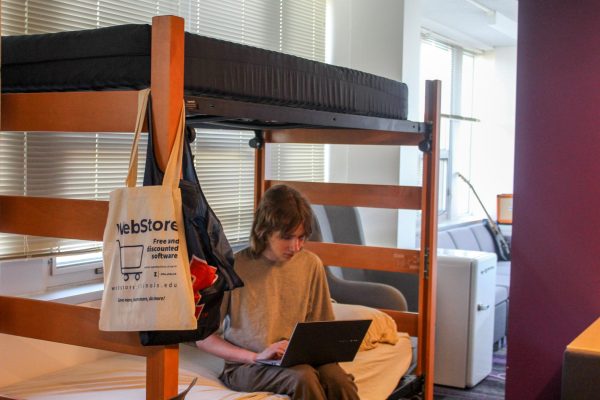Long-term care, long-term empathy
Nov 5, 2014
While most people associate November with pumpkin spice lattes, the start of biting temperatures and beautiful, changing foliage, I’m the odd one out. I recognize November in regards to Long-Term Care Awareness month — a month dedicated to raising awareness for those who require long-term care and for their options.
Over the summer, I trained to receive my Certified Nursing Assistant license. This required daily classroom hours spent learning materials and listening to lectures. My favorite part, however, was when we got hands-on training in a long-term care facility, which housed patients with dementia.
Each student was assigned a patient in the facility and had to mirror the typical duties a CNA would carry out, which ranged from feeding the resident to checking their vitals, such as heart rate and blood pressure. What I found during my time training in health care and from being here at the University is that the ability to empathize with other people is a skill that is often overlooked and extremely invaluable. Empathy involves the ability to understand someone else’s emotions from their point of view.
When I started working in the facility, I was mostly anxious about completing my tasks for the day so that my instructor wouldn’t be disappointed in me. Scared and worried about getting through the day, I efficiently completed my tasks without actually sitting down and conversing with the people right in front of me.
I forgot how to properly take care of other individuals. It doesn’t just mean running through a list of tasks that are supposed to physically make them feel better; it means taking the time to not only see your own perspective, but another individual’s perspective. And sometimes that perspective can include pain, grief, sadness and an overwhelming amount of emotions.
Get The Daily Illini in your inbox!
This experience I had at the facility is just as transferable to the University. Often, you’ll see people walking by those who are homeless on Green Street or students complaining about maintenance workers, staff members and bus drivers. Sometimes even roommates bicker about petty problems. In all three instances, the ability to understand another person’s feelings and share their pain before thinking about ourselves seems nonexistent.
College students specifically have been affected by this lack of empathy on a large scale. According to a study done by University of Michigan researcher Sara Konrath, college students are 40 percent less empathetic than those of 30 years ago.
The reason we empathize less than the young adults of the past could be the result of many things, and no one can be sure of which reason is most accurate. However, what I’ve found in my experience on campus and in the facility where I was a CNA is that empathy takes extra work and time that most people don’t have. It can be challenging to find time to sit down and talk to someone during hectic schedules, and being empathetic is sometimes emotionally exhausting.
Many of us often don’t see the importance of spending time to ask how another person is doing or to offer help when it cannot benefit us; often, putting ourselves first is much easier and faster.
I, too, was a culprit of this while working in the facility; with the overwhelming list of tasks that needed to be done, “socializing” with the residents was the last thing on my to-do list.
Instead, we should find it within ourselves to put on another individual’s shoes, see through their eyes, or whatever cliche, yet accurate, description of empathy you’ve heard.
As soon as I sat down with a group of women in the facility over the summer and listened to their thrilling stories of rowdy children, previous jobs and hilarious past experiences at college, the more my job automatically revolved around my patients’ well-being, health and happiness.
When I took the time to understand how the residents I cared for were feeling, I was immediately flooded with comments on how safe, secure and even valued they felt in my care. That is the power that empathy holds. In the last days that some of these residents had, I was able to bring a little light into their lives.
So whether you take notes for a student in class who is ill that day or you go out of your way to pick up trash for the already-busy maintenance worker, understand that empathy is a choice.
We have to choose to care, to improve, to recognize that every individual has a plate full of problems. Only when we become willing to feel others’ pain along with our own do we comprehend what it means to be human.
Kaanan is a freshman in LAS. She can be reached at [email protected].






